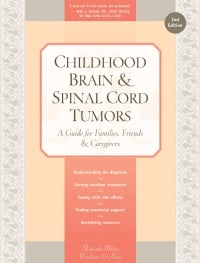Childhood Brain and Spinal Cord Tumors
Online support
Parents from small, isolated communities may have a difficult time finding a support group in their area that fits their needs, as may single parents, parents who aren’t able to attend support group meetings, or parents who prefer some anonymity. For these parents and families, finding emotional support is possible via the Internet. Many online discussion groups exist for families dealing with childhood cancer. Such groups can provide parents with the understanding that only another parent of a child with cancer can give. Topics might include coping skills that have been effective for other families or helpful medical information you can use in your fight against childhood cancer.
The support I have gained through online discussion groups is priceless. I have received a great deal of comfort from my participation in these groups. They have enabled me to connect with families from all over the world, many of whom are fighting the exact same disease. I have often come to my computer in the middle of the night, when everyone else in the house was asleep. I can express my fears at 3:00 a.m. and know someone will always be there to reassure me with the knowledge that they have felt these things, too. That’s one of the most beautiful things about these groups. Someone is always there, even in the middle of the night.

How ironic that we subscribed to this list in a moment of panic, with a black cloud lined with despair lingering above. But now we can say we have lassoed cyberspace, and here, among new friends, we have found and we have shared love, hope, support, informative information, mutual stories, mutual questions, thoughtful and sincere answers, honesty, disagreement, pain, inspiration, fundraising, friendship, humor, and enjoyment, as well as understanding. This list reflects the roller coaster of life. Activity on this list enables individuals to place that initial black cloud in their back pocket, hold sunshine in their hand, and watch hope dance above.
To find brain tumor discussion groups (or electronic mailing list services), parents can start by consulting the following websites: www.acor.org, www.braintrust.org, and www.yahoogroups.com (see Appendix C, Books and Websites). Electronic chat rooms often are not monitored, but some lists are carefully monitored by moderators. One of the largest lists, composed of almost 2,200 members and dedicated to brain tumor caregivers, health specialists, and patients, is the Braintmr list, which is sponsored by T.H.E. Brain Trust and available at www.braintrust.org.
Table of Contents
All Guides- Introduction
- 1. Diagnosis
- 2. The Brain and Spinal Cord
- 3. Types of Tumors
- 4. Telling Your Child and Others
- 5. Choosing a Treatment
- 6. Coping with Procedures
- 7. Forming a Partnership with the Treatment Team
- 8. Hospitalization
- 9. Venous Catheters
- 10. Surgery
- 11. Chemotherapy
- 12. Common Side Effects of Chemotherapy
- 13. Radiation Therapy
- 14. Peripheral Blood Stem Cell Transplantation
- 15. Siblings
- 16. Family and Friends
- 17. Communication and Behavior
- 18. School
- 19. Sources of Support
- 20. Nutrition
- 21. Medical and Financial Record-keeping
- 22. End of Treatment and Beyond
- 23. Recurrence
- 24. Death and Bereavement
- 25. Looking Forward
- Appendix A. Blood Tests and What They Mean
- Appendix C. Books and Websites

